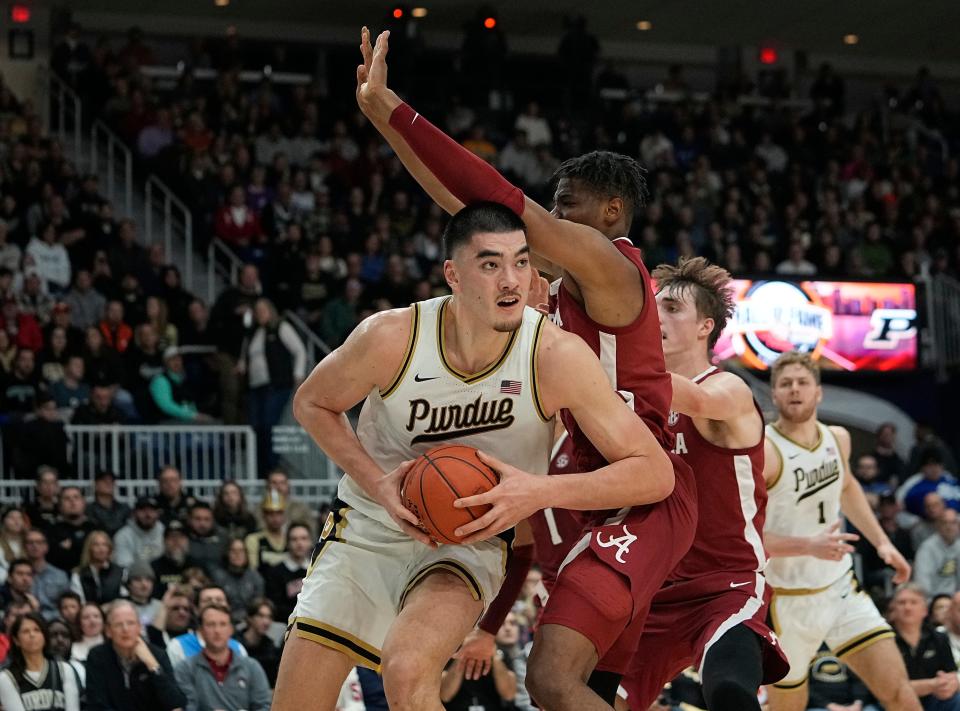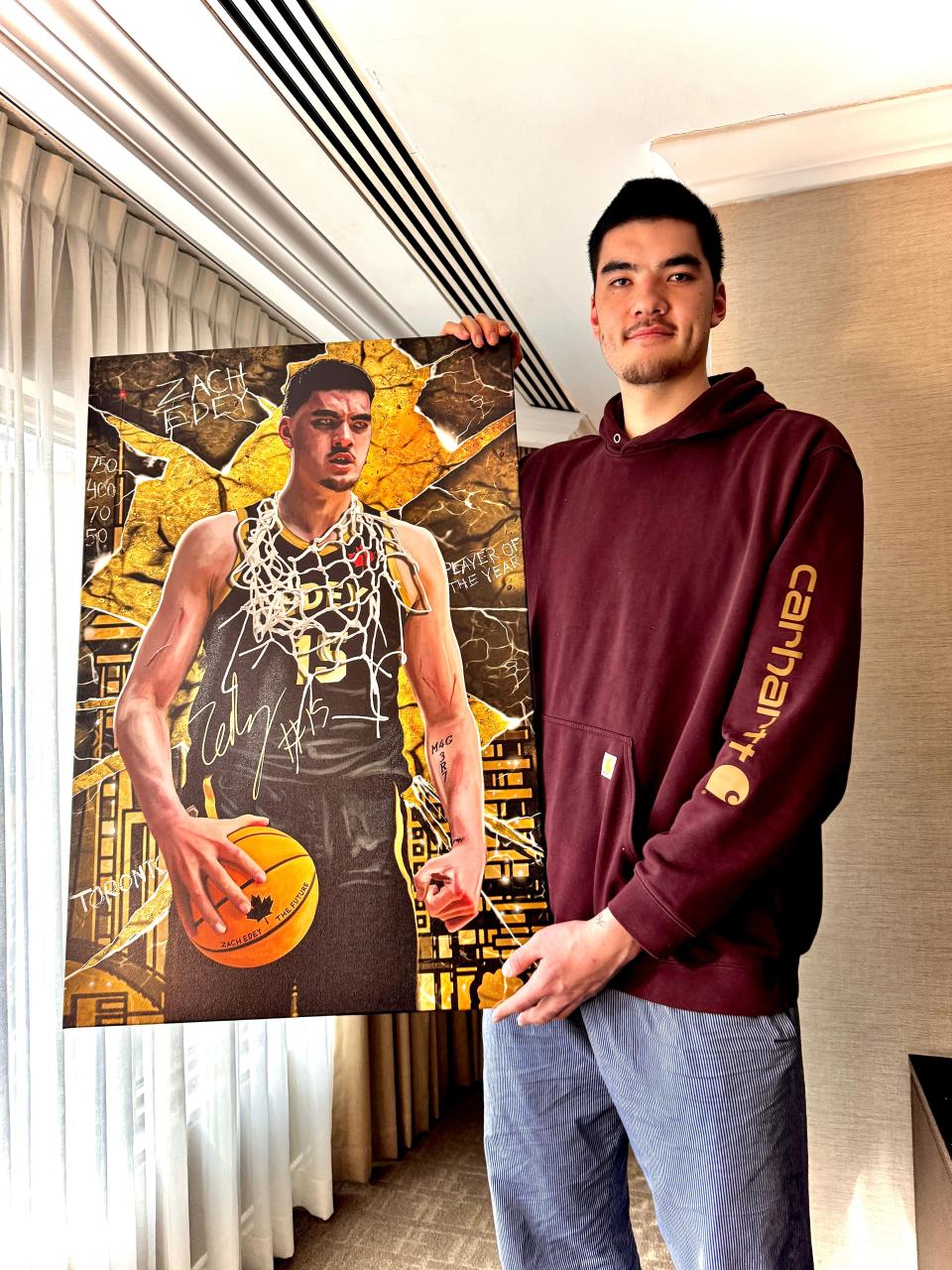How Zach Edey, Purdue men's hoops star, is overcoming immigration law to benefit from NIL
It is a rarity for Zach Edey not to be noticed when he steps out in public.
He is hard to miss at 7-foot-4 and weighing nearly 300 pounds. As one of college basketball's best players, the requests for his services, whether for interviews, photographs, or autographs, are a reminder of how good and popular he is.
Last year, he racked up every significant player of the year award, becoming the first player in NCAA history with at least 750 points, 400 rebounds, 70 blocks and 50 assists in a single season while leading Purdue to a No. 1 seed in the NCAA tournament (they were upset in the first round by Fairleigh Dickinson).
Edey delayed a decision to enter the NBA draft to return to Purdue for his senior season and try to win a championship. But one would think the most recognizable player in the country would roll in the name, image, and likeness deals that have dominated college sports since the NCAA authorized the policy on July 1, 2021. The rule opened up the endorsement marketplace to college players that had been limited to professional athletes.

Why Zach Edey is limited in benefitting from NIL
There are two things limiting Edey's ability monetize his basketball skill.
First, he is Canadian.
Second, United States immigration law keeps a tight rein and an observant eye on those from other countries to make sure the rules put in place are adhered to, limiting chances to earn money while in school.
The 21-year-old Edey is in the United States on a F-1 visa, which allows a person to study at a university for a certain period.
It also means that Edey can't get paid from any NIL deals unless he is physically in his home country.
F-1 visa law impacts NIL
Gabriel Castro, Senior Associate at BAL, which specializes in immigration law, said that for athletes such as Edey, the current structure of the law puts a clamp on potential earnings.
The Immigration and Nationality Act was enacted in 1952, establishing three routes where foreigners can pursue an education in the United States. The NCAA says that nearly 13% of all athletes in Division I are international, including 17% who play basketball.
"The F-1 student visa regulations are going back decades. I don't think they really conceived the idea of student-athletes really being important when they were making these decisions. But they definitely didn't know that NIL would allow the athletes to be paid," Castro said. "The NCAA didn't really put out compliance rules and it's created a lot of uncertainty in that market and not even thinking on how it would affect international students."
The law surrounding F-1 visas expects a person to be a full-time student, and the opportunities to work under those conditions are limited, especially for student-athletes.
"If you are here to study engineering, the regulations allow you to go and get an internship in engineering, but is limited to that field of study," Castro said. "When we look at what kind of possibilities F-1 foreign international student-athletes are going to have? Very limited when it comes to using their degree to be able to take advantage of name, image and likeness deals."
The issue has gained the interest of members of Congress. In October, Sens. Pete Ricketts (R-Neb.) and Richard Blumenthal (D-Conn.) introduced a bill to amend immigration laws to allow international athletes to have NIL deals in the United States. Rep. Lori Trahan (D-Mass.) and Sen. Chris Murphy (D-Conn.) also introduced a wider NIL bill in their respective chambers that includes a provision addressing the immigration laws.
Luckily for him, last weekend, Edey had two days to capitalize on that when the Boilermakers traveled to his hometown of Toronto to take on Alabama.
During the trip to Canada, Edey took advantage of his two days there and teamed up with Daps on a name, image, and likeness deal.
While the opportunity to put some extra coin in his pocket is appealing, make no mistake: Edey is all about basketball. When asked if he cared about being able to cash in on NIL, the easy-going, nonchalant personality he is known for came through.
"Not particularly," Edey told USA TODAY Sports. "But now that I am getting paid, thinking back on it, it was ridiculous that we weren't getting paid. At the time, the only thing I was focused on was my basketball, as it is now."
Before consummating any deal, Purdue and Edey's representatives at Priority Sports ensured it didn't break U.S. immigration law, where it could jeopardize the status of the reigning Wooden Award winner as a student-athlete, where law violators could face deportation.
But it's not all cut and dried. As Castro says, no clear guidance exists on how international athletes get deals done. Most universities operate under different standards and contact their immigration legal counsel to determine what is allowable.

Zack Edey's NIL deal
Founded by Jake Klores, Daps is a New York-based start-up that likens its company to "Shopify for athletes." Klores says he thinks a significant gap exists between how modern sports fans want to interact with and celebrate their favorite athletes.
The app allows fans to bid live during games on game-worn shoes and jerseys, or bid on high-value items such as a signed painting and also get video calls and social media shoutouts from their favorite basketball players.
Golden State Warriors forward Jonathan Kuminga, Miami Heat guard Duncan Robinson, New York Knicks forward Isaiah Hartenstein, Marquette guard Tyler Kolek, and Providence forward Bryce Hopkins are some basketball players with deals with Daps.
"We are building the infrastructure and technology to make it easy for athletes to run their direct fan businesses on their terms while at the same time giving sports fans unique access to the athletes they love," Klores told USA TODAY Sports. "It also became an opportunity for the athlete to make much-deserved money for themselves and a provide a unique brand-building chance."
The opportunity finally arrived to work out a deal, and once in Canada, Edey had limited time between his basketball duties and promoting his NIL deal.
For Edey's NIL deal, he said it was essential to give back to fans, so a drawing will be held on the app, allowing them to buy limited edition autographed cards until Dec. 22, when 100 users will be randomly selected. There is also an auction for the 1/1 signed canvas. Last week, he dropped two autographed cards in collaboration with pop-culture artist Jordan Spector that are available on the Daps app.
Edey's trip back home was business as usual on the basketball court as he matched his season-high with 35 points and added seven rebounds in a 92-86 victory over the Crimson Tide. It was the first time in six years he played in front of home fans; he spent his final high school seasons at powerhouse IMG Academy in Bradenton, Florida.
"It was really cool being able to show my teammates where I'm from and how I grew up, and I'm glad that Purdue scheduled the game for me," Edey said.
This article originally appeared on USA TODAY: Purdue's Zach Edey found NIL loophole despite immigration law rule
